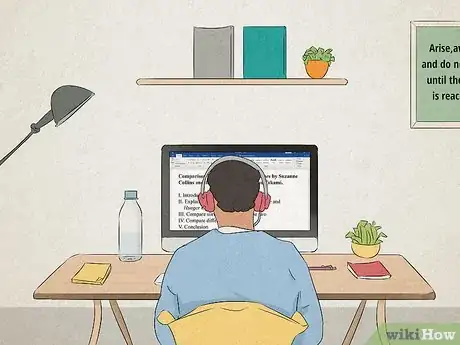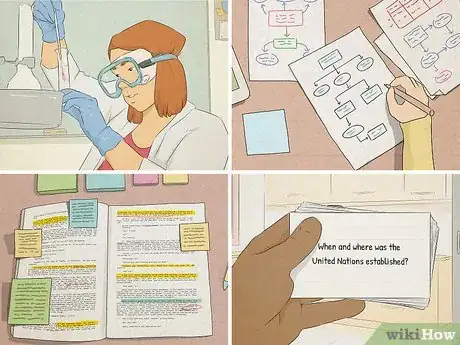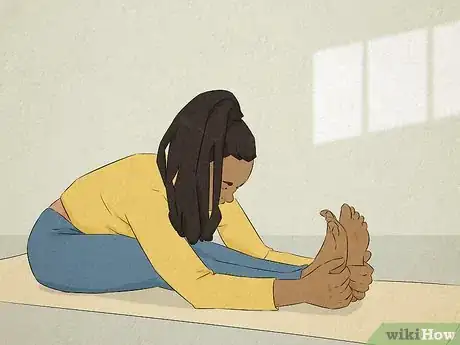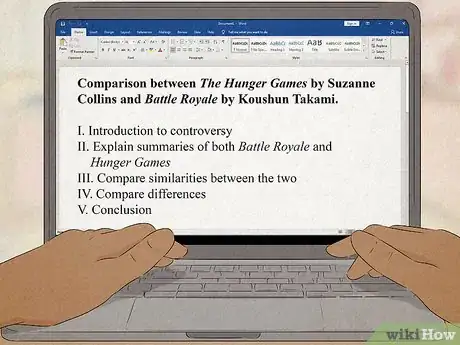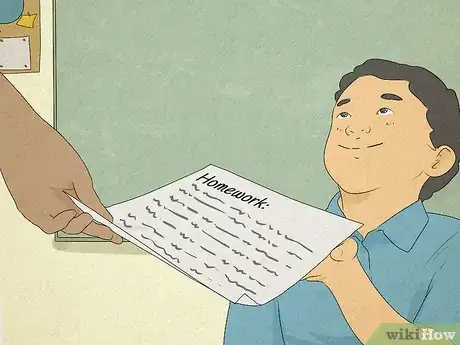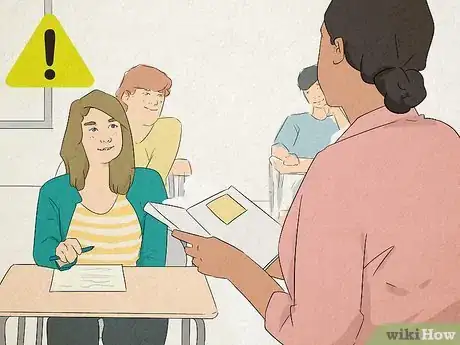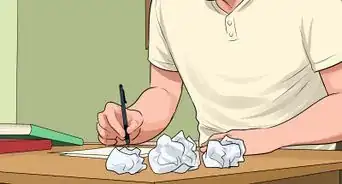This article was co-authored by Jennifer Kaifesh and by wikiHow staff writer, Amy Bobinger. Jennifer Kaifesh is the Founder of Great Expectations College Prep, a tutoring and counseling service based in Southern California. Jennifer has over 15 years of experience managing and facilitating academic tutoring and standardized test prep as it relates to the college application process. She takes a personal approach to her tutoring, and focuses on working with students to find their specific mix of pursuits that they both enjoy and excel at. She is a graduate of Northwestern University.
There are 13 references cited in this article, which can be found at the bottom of the page.
wikiHow marks an article as reader-approved once it receives enough positive feedback. This article received 25 testimonials and 84% of readers who voted found it helpful, earning it our reader-approved status.
This article has been viewed 669,103 times.
It's disappointing when your grades are lower than you want them to be, but don't get discouraged! It happens to almost everyone at some point. If it's early enough in the term, you may even be able to get a better grade in the classes you're struggling in now, but even if not, you can apply these tips to help you do better in your next course. Just keep trying—when you find the study habits that work best for you, you're almost certain to see it reflected in your grades!
Steps
Expert Q&A
Did you know you can get expert answers for this article?
Unlock expert answers by supporting wikiHow
-
QuestionHow can I be more productive after school?
 Jennifer KaifeshJennifer Kaifesh is the Founder of Great Expectations College Prep, a tutoring and counseling service based in Southern California. Jennifer has over 15 years of experience managing and facilitating academic tutoring and standardized test prep as it relates to the college application process. She takes a personal approach to her tutoring, and focuses on working with students to find their specific mix of pursuits that they both enjoy and excel at. She is a graduate of Northwestern University.
Jennifer KaifeshJennifer Kaifesh is the Founder of Great Expectations College Prep, a tutoring and counseling service based in Southern California. Jennifer has over 15 years of experience managing and facilitating academic tutoring and standardized test prep as it relates to the college application process. She takes a personal approach to her tutoring, and focuses on working with students to find their specific mix of pursuits that they both enjoy and excel at. She is a graduate of Northwestern University.
Academic Tutor Allow yourself a set amount of time to unwind after school, like 30 minutes, and have a snack, relax, check Instagram, etc. Then commit to diving into your homework right away; procrastinating until late at night when you’re exhausted will generally result in lower quality work and mean you are up later (and thus getting less sleep) than you should be. Treat things like watching TV or playing around online as rewards for finishing your work: don’t let yourself do it until you’ve completed all of your assignments.
Allow yourself a set amount of time to unwind after school, like 30 minutes, and have a snack, relax, check Instagram, etc. Then commit to diving into your homework right away; procrastinating until late at night when you’re exhausted will generally result in lower quality work and mean you are up later (and thus getting less sleep) than you should be. Treat things like watching TV or playing around online as rewards for finishing your work: don’t let yourself do it until you’ve completed all of your assignments. -
QuestionIs it better to wake up early or stay up late to study?
 Jennifer KaifeshJennifer Kaifesh is the Founder of Great Expectations College Prep, a tutoring and counseling service based in Southern California. Jennifer has over 15 years of experience managing and facilitating academic tutoring and standardized test prep as it relates to the college application process. She takes a personal approach to her tutoring, and focuses on working with students to find their specific mix of pursuits that they both enjoy and excel at. She is a graduate of Northwestern University.
Jennifer KaifeshJennifer Kaifesh is the Founder of Great Expectations College Prep, a tutoring and counseling service based in Southern California. Jennifer has over 15 years of experience managing and facilitating academic tutoring and standardized test prep as it relates to the college application process. She takes a personal approach to her tutoring, and focuses on working with students to find their specific mix of pursuits that they both enjoy and excel at. She is a graduate of Northwestern University.
Academic Tutor The most important thing is that you are getting enough sleep for your brain and body to recharge fully, or at least as much as it possibly can. You know better than anyone whether you are a morning person or a night owl, so try to set a schedule that best suits your natural rhythm. When deadlines are imminent and you don’t have this luxury, it is typically better to stay up and work late the night before rather than wake up early to get it done right before a test—if there is more work than you anticipated, you have a greater buffer to get everything done (and done well).
The most important thing is that you are getting enough sleep for your brain and body to recharge fully, or at least as much as it possibly can. You know better than anyone whether you are a morning person or a night owl, so try to set a schedule that best suits your natural rhythm. When deadlines are imminent and you don’t have this luxury, it is typically better to stay up and work late the night before rather than wake up early to get it done right before a test—if there is more work than you anticipated, you have a greater buffer to get everything done (and done well). -
QuestionHow can I stop myself from getting sleepy when I study?
 Jennifer KaifeshJennifer Kaifesh is the Founder of Great Expectations College Prep, a tutoring and counseling service based in Southern California. Jennifer has over 15 years of experience managing and facilitating academic tutoring and standardized test prep as it relates to the college application process. She takes a personal approach to her tutoring, and focuses on working with students to find their specific mix of pursuits that they both enjoy and excel at. She is a graduate of Northwestern University.
Jennifer KaifeshJennifer Kaifesh is the Founder of Great Expectations College Prep, a tutoring and counseling service based in Southern California. Jennifer has over 15 years of experience managing and facilitating academic tutoring and standardized test prep as it relates to the college application process. She takes a personal approach to her tutoring, and focuses on working with students to find their specific mix of pursuits that they both enjoy and excel at. She is a graduate of Northwestern University.
Academic Tutor First of all, snacks—but the right snacks. Feeding your body can also feed your brain: choose something somewhat healthy (chocolate-covered almonds, for instance) that you also enjoy. Particularly when reading a textbook, it’s easy to drift off—even if your eyes are moving over the words, your brain isn’t necessarily processing it. Stop after each paragraph and ask yourself to summarize it. Don’t let yourself get too far without making sure you’re actually retaining what you’ve read. Finally, find other ways to engage in active (instead of passive) studying. For instance, rather than reading or rereading a chapter, create physical flashcards that cover the material and quiz yourself.
First of all, snacks—but the right snacks. Feeding your body can also feed your brain: choose something somewhat healthy (chocolate-covered almonds, for instance) that you also enjoy. Particularly when reading a textbook, it’s easy to drift off—even if your eyes are moving over the words, your brain isn’t necessarily processing it. Stop after each paragraph and ask yourself to summarize it. Don’t let yourself get too far without making sure you’re actually retaining what you’ve read. Finally, find other ways to engage in active (instead of passive) studying. For instance, rather than reading or rereading a chapter, create physical flashcards that cover the material and quiz yourself.
ReIated wikiHows
- Get Higher Marks in Exams
- Calculate GPA
- Be the Best Student in Your Class
- Maintain a High GPA in College
- Get Good Grades
- Get Good Grades in Economics
- Be Responsible and Have Good Grades
References
- ↑ https://www.livecareer.com/resources/careers/recent-grads/getting-better-grades
- ↑ Jennifer Kaifesh. Academic Tutor. Expert Interview. 8 November 2019.
- ↑ https://www.oxford-royale.co.uk/articles/improve-underperforming-grades.html
- ↑ https://www.oxford-royale.co.uk/articles/improve-underperforming-grades.html
- ↑ https://kidshealth.org/en/teens/test-anxiety.html
- ↑ https://pennstatelearning.psu.edu/test-taking-tips
- ↑ https://www.livecareer.com/resources/careers/recent-grads/getting-better-grades
- ↑ https://rabbitfood.sdstate.edu/online/5-ways-to-improve-your-grades-in-online-classes
- ↑ https://www.oxford-royale.com/articles/improve-underperforming-grades/
- ↑ https://www.livecareer.com/resources/careers/recent-grads/getting-better-grades
- ↑ https://www.oxford-royale.com/articles/improve-underperforming-grades/
- ↑ https://collegeinfogeek.com/how-to-take-notes-in-college/
- ↑ https://rabbitfood.sdstate.edu/online/5-ways-to-improve-your-grades-in-online-classes
- ↑ https://www.cdc.gov/healthyyouth/health_and_academics/pdf/health-academic-achievement.pdf
- ↑ https://time.com/5689957/sleep-college-students-grades/
- ↑ https://kidshealth.org/en/teens/test-terror.html
- ↑ https://www.oxford-royale.com/articles/improve-underperforming-grades/
- ↑ https://www.oxford-royale.com/articles/improve-underperforming-grades/
About This Article
To improve your grades, start by studying continuously so that your brain has time to process the material you're learning, rather than cramming the day before a test. Wen studying, make study cards with a few facts or concepts on them so you can brush up on some of them each day. During class, stay focused on the information by asking questions and taking notes for future reference. Before a test, practice time management by studying in an area free from distractions and aiming to complete tasks within a set period of time. For tips on how to identify your learning style and when to ask teachers for extra help, keep reading!
